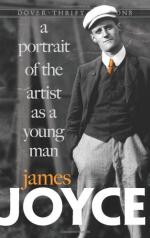He opened the door of the theatre and halted in the chilly grey light that struggled through the dusty windows. A figure was crouching before the large grate and by its leanness and greyness he knew that it was the dean of studies lighting the fire. Stephen closed the door quietly and approached the fireplace.
—Good morning, sir! Can I help you?
The priest looked up quickly and said:
—One moment now, Mr Dedalus, and you will see. There is an art in lighting a fire. We have the liberal arts and we have the useful arts. This is one of the useful arts.
—I will try to learn it, said Stephen.
—Not too much coal, said the dean, working briskly at his task, that is one of the secrets.
He produced four candle-butts from the side-pockets of his soutane and placed them deftly among the coals and twisted papers. Stephen watched him in silence. Kneeling thus on the flagstone to kindle the fire and busied with the disposition of his wisps of paper and candle-butts he seemed more than ever a humble server making ready the place of sacrifice in an empty temple, a levite of the Lord. Like a levite’s robe of plain linen the faded worn soutane draped the kneeling figure of one whom the canonicals or the bell-bordered ephod would irk and trouble. His very body had waxed old in lowly service of the Lord—in tending the fire upon the altar, in bearing tidings secretly, in waiting upon worldlings, in striking swiftly when bidden—and yet had remained ungraced by aught of saintly or of prelatic beauty. Nay, his very soul had waxed old in that service without growing towards light and beauty or spreading abroad a sweet odour of her sanctity—a mortified will no more responsive to the thrill of its obedience than was to the thrill of love or combat his ageing body, spare and sinewy, greyed with a silver-pointed down.
The dean rested back on his hunkers and watched the sticks catch. Stephen, to fill the silence, said:
—I am sure I could not light a fire.
—You are an artist, are you not, Mr Dedalus? said the dean, glancing up and blinking his pale eyes. The object of the artist is the creation of the beautiful. What the beautiful is is another question.
He rubbed his hands slowly and drily over the difficulty.
—Can you solve that question now? he asked.
—Aquinas, answered Stephen, says PULCRA SUNT QUAE visa placent.
—This fire before us, said the dean, will
be pleasing to the eye.
Will it therefore be beautiful?
—In so far as it is apprehended by the sight, which I suppose means here esthetic intellection, it will be beautiful. But Aquinas also says BONUM EST in quod TENDIT APPETITUS. In so far as it satisfies the animal craving for warmth fire is a good. In hell, however, it is an evil.
—Quite so, said the dean, you have certainly hit the nail on the head.




